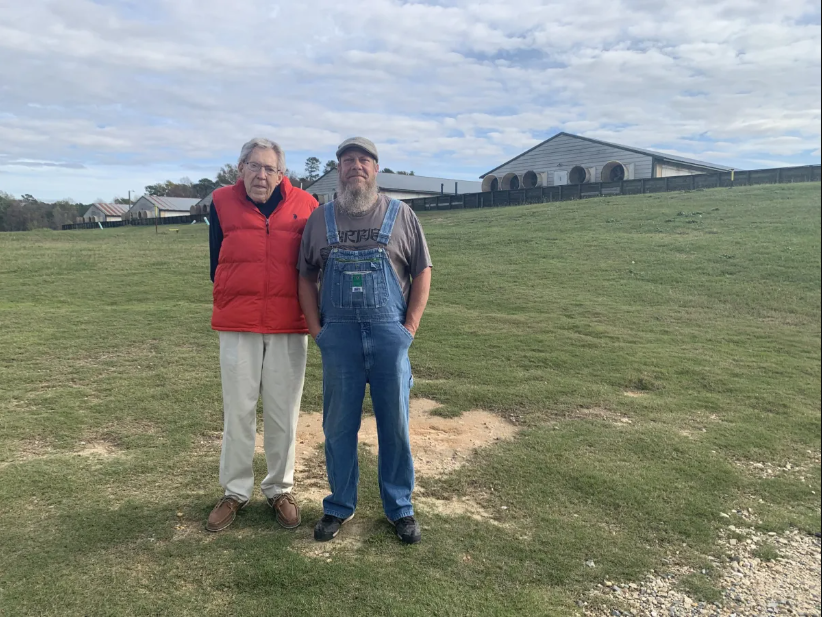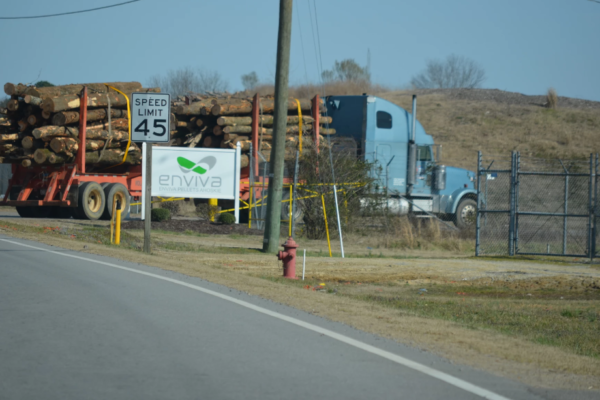By: Will Atwater, North Carolina Health News
December 6, 2022
After nearly three decades as a contract hog producer, Tom Butler is working with his son to return the family farm to a lagoon-free enterprise.
Tom Butler has had enough and wants out.
In 1995, he and his brother Robert took over the family tobacco farm just as the industry was declining. Both their father and grandfather were tobacco farmers, but soon after taking over that legacy operation, they decided to pivot away from growing tobacco and signed on as contract hog growers for Prestage Farms. Tom Butler said he and his late brother were seduced by the idea of making easy money.
The Butlers started out with four hog houses and based on what they were told about earning potential, they envisioned a life that was a far cry from the reality they experienced.
“You'd stay at home with your family and just be happy; you’d go to Hawaii twice a year on vacation with all the money you would have,” he said. “That was what was presented to us, it was [preying] on the American dream.”
Now, 27 years later, standing on a concrete floor in a 10-foot x 10-foot room equipped with fluorescent lights and metal shelves, Tom Butler and his son Will Butler have a new dream.
“We'll start out small to make sure we're doing everything right and then we'll get bigger,” said Will Butler.
He’s referring to his and his dad’s plan to grow oyster mushrooms in the space, which they say, is about 70 percent completed. The father and son team expects to produce more than 200 pounds of mushrooms per week in this room.
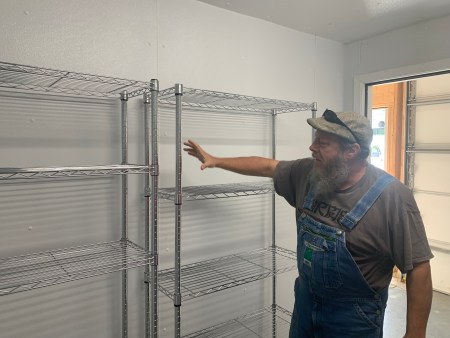
A key point about mushroom production is that the process doesn’t require soil to produce a crop. Once the room is ready, the Butlers will receive mushroom spores in individual bags containing special growing media or they will receive logs that have been inoculated with mushroom spores, according to Tom Butler.
If the experiment proves successful, Will Butler has a specific goal in mind to achieve before embarking on a marketing campaign designed to capture high-end clients. He wants to offer mushrooms to people who otherwise could not afford to purchase them in upscale markets or restaurants.
“I want to feed people first. I would go to farmers markets and I would cater to our EBT (Electronic Benefits Transfer) recipients … because not all people are eating these kinds of mushrooms,” he said.
After nearly three decades as a contract hog producer, Tom Butler, 81, sees his new legacy as an opportunity to gradually step away from a business that he says has saddled him with huge debts, is harmful to the environment, is a nuisance to neighbors and one that provides little autonomy to contract growers, who operate at the mercy of corporations that have become increasingly distant.
Tom and Will Butler are on a mission to guide the multigenerational family business away from commercial hog production toward a more sustainable and environmental-friendly future that, eventually, the grandchildren - a fifth generation - could take over.
The Butlers’ attempt to transition away from contract hog production coincides with recent events, which illustrate just how hazardous concentrated animal feeding operations (CAFOs) can be for the environment and human health.
In September, it was revealed that White Oak Farms, located in Wayne County, had a lagoon spill that resulted in thousands of gallons of hog waste being emptied into the Nahunta Swamp.
A study released in March 2022, found that people who live in communities near CAFOs tend to experience higher rates of acute gastrointestinal illness than those who do not, and in North Carolina, the majority of folks who live near CAFOs are people of color. A different study, released on December 1, 2022, found that two percent of North Carolina’s swine and poultry CAFOs are in or near floodplains, putting some drinking water sources at risk.
The N.C. Swine Floodplain Buyout Program was established in 2000 to buy out and close swine operations located in flood plains.
“It takes on average $800,000 to $1,000,000 to buy out a swine operation,” said David B. Williams, deputy director of the N.C. Division of Soil and Water Conservation in the state Department of Agriculture. “[Farmers] that have significant infrastructure invested, they can’t afford to just walk away from that. We have to overcome a considerable amount of debt for the farmer to be able to get out in many cases.”
That program is currently stalled and has not received funding to support more buyouts since 2018. To date, the program has spent more than $18 million to buy out swine operations and there are others waiting to apply if and when the legislature allocates more funds.
A race against sludge
Tom Butler and thousands of North Carolina contract swine growers are facing the same reality: time is not an ally. Operating an industrial hog farm requires a way to manage hog waste which is generated daily and, most often, stored in a pit. Over time, the pits fill with sludge.
Annually, in North Carolina, 9 million hogs generate more than 10 billion gallons of waste, according to a document produced in 2020.
“The liquid waste is a small problem, the sludge is a killer. And it will eventually, if they don't do something about it soon, cripple the swine industry in North Carolina,” said Tom Butler. “It will actually shut it down.”
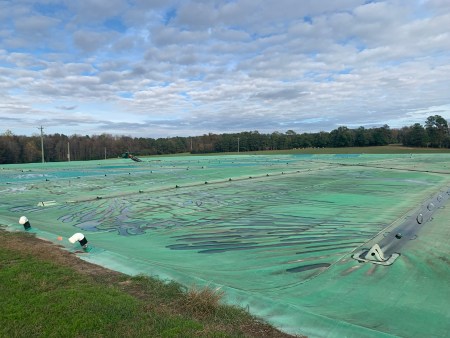
Butler Farms, in the Harnett County town of Lillington, is one of the few where the lagoons are covered with a tarp to minimize odors and CO2 emissions and to eliminate the potential for flooding, Tom Butler said. However, lagoons have limited storage capacity and Butler Farms is running out of space.
“We had no idea … we were gonna be handling the waste of a U.S. city the size of 30,000 people,” Tom Butler said. “A pig produces about five or six times more fecal matter and urine than a human does [and] the accumulation of the waste over a period of 27 years is where we are now.”
What’s more, there has been a moratorium on the construction of hog waste lagoons since 1997. This temporary ban was made permanent in 2007. Confined hog operations across the state are running out of sludge storage space and have limited options to remedy the situation without taking on more debt. Tom Butler and environmentalists argue that Smithfield Foods should be required to fund alternative technologies for dealing with hog waste.
Spraying is not the answer
Like many contract farmers, Butler Farms operates a “ feeder to finish” program — every 17 weeks the farm receives approximately 8,000 piglets that weigh between 45 to 50 pounds and in a little more than four months the animals are shipped out, each weighing between 250 to 300 pounds, according to Tom Butler.
To prevent lagoons from overflowing, a 19-inch buffer (also known as freeboard) must be maintained between the top of the lagoon and the liquid waste. To regulate waste accumulation, farmers use the lagoon-and-sprayfield system to periodically spray excess liquid waste on agricultural fields to fertilize the soil. Tom Butler planted his fields with Coastal Bermuda Hay, which he says can absorb as much as 300 pounds of nitrogen per acre.
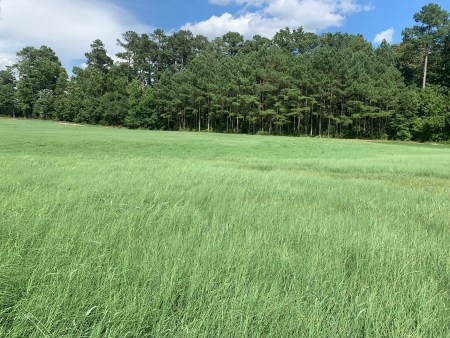
While spraying liquid waste on agricultural fields helps reduce sludge buildup, it adds nitrates to soil and contaminates the air. Beyond the odor caused by spraying pig poop on land, studies show that long-term exposure to particulate matter (PM 2.5), present in spray droplets, can cause cardiovascular disease.
“I'm a dedicated contract grower, and I have no intentions of hurting the industry or being a bad player,” Tom Butler said, “But the waste management issues that we have are atrocious. All I've done over the past 15 years is tried to get the industry to agree to move away, or, you know, do what's right and adopt newer technology.”
Though spraying is legal, this process is highly criticized by environmentalists as it can create runoff issues, negatively impact air quality, and contaminate soil by adding heavy metals. The process has also generated complaints – and lawsuits – from neighbors.
A 2018 study published in N.C. Medical Journal found that communities near hog farms had higher rates of infant mortality and deaths caused by anemia, kidney disease, tuberculosis and septicemia. The study didn’t directly link the deaths to hog farms, saying more research was needed.
Keeping his word
Along with the issues generated by hog lagoon sludge accumulation, the odor from contract hog operations located in eastern North Carolina has been well documented and was the topic of three nuisance lawsuits brought against Murphy Brown/Smithfield Foods that took place in 2018. The suits were brought on behalf of residents in Bladen, Duplin and Pender Counties, who claimed their quality of life was being harmed by the foul odor created by hog lagoons.
Early on in the venture, when the Butler brothers began receiving odor complaints from their neighbors, they made a commitment.
“[Because] we care about our neighbors, my brother and I took an oath to do whatever we could to lessen our impact,” Tom Butler said.
Instead of selling the farm and risking it falling into the hands of someone who would have little regard for the neighbors or the environment, Tom Butler has maintained it and has continued to keep the oath he and his brother made more than two decades ago.
In 2008, he used grant money to pay for two lagoon covers, “which stopped the lagoon odor from drifting out through the community,” he said.
“When people don't smell you, they don't hate you,” he said. “But when they smell you they dislike you very much.”
The commitment to community and the environment has cost Tom Butler both financially and politically. He says his debt load now is as much as it was when he first went into business due to the farm investments he’s made.
In 2018, Tom Butler’s commitment to his neighbors was on full display when he testified on behalf of the plaintiffs in the nuisance trials. He risked the possibility of losing his livelihood to do what he felt was right. In each case, the jury sided with the plaintiffs.
“It took me probably 10 years to speak out, because I was afraid they would take our contract and I'd be left sitting here with a $600,000 or $700,000 bill that I couldn’t pay.”
Adopting new technologies
As an alternative to storing hog waste in pit lagoons and also as a way to harness methane gas, which is generated by all that fecal matter into a marketable commodity, Smithfield Foods, the largest U.S. pork producer, is promoting an endeavor it’s calling Renewable Natural Gas. According to a 2018 press release, Smithfield Foods is partnering with Dominion Energy to develop projects in North Carolina, Virginia and Utah.
Smithfield and Dominion Energy claim the endeavor will provide additional revenue for contract growers and reduce greenhouse gas emissions. However, critics say that, in the end, this process will generate even more money for Smithfield and do little to address the negative environmental impacts caused by hog lagoons, with the exception of reducing carbon emissions.
“Smithfield will profit off of biogas and yet the industry is making no commitment whatsoever to redirect any of that additional revenue,” said Blakely Hildebrand, senior attorney, Southern Environmental Law Center, “to cleaning up their mess in these communities or making the situation on the ground in these communities better, they just refuse to do that.”
Anaerobic digestion is the process by which bacteria break down animal waste — in this case, hog manure — in an oxygen-free environment provided by an anaerobic digester. Through this process, methane gas is produced, separated from the remaining sludge and piped to a processing center where it’s cleaned and sold as renewable energy.
Driven by his commitment to minimizing harm to his community and the environment, Tom Butler has proven to be an innovator. Aside from investing in lagoon covers, which trap odors and prevent carbon dioxide emissions and runoff during rain events, he also spent roughly $400,000 to purchase an anaerobic digester system and a generator used to convert methane into electricity, which he sells to the local grid, he said.
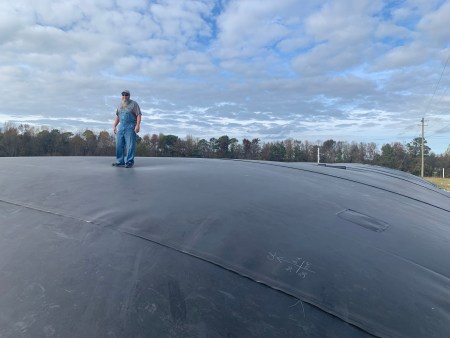
Beyond sequestering some CO2 and using methane as a renewable energy source, Tom Butler says the Smithfield biogas project does not address the sludge problem. However, he says he’s seen an effective process for treating waste called reverse osmosis. He described a process that will purify hog waste onsite and eliminate the need for the sprayfield system.
“I've been to two dairies and one hog farm where I actually drank the water that came out of the pit that day,” he said. “It's just good fresh water, you can actually take their waste and feed it back to them, which is a big water savings, instead of just spraying it out on the field and contaminating the ground, the air and the water.”
But reverse osmosis technology is pricey and uses a lot of energy, which also costs.
But Tom Butler and others say the industry is not willing to spend money needed to assist contract growers with installing technology that would replace the sprayfield system.
No policy, no change
In 2000, the Smithfield Agreement was an arrangement reached by then-Attorney General Mike Easley, Smithfield Foods and its subsidiaries. One of the stipulations contained in the agreement required Smithfield Foods to finance research into new technologies that would provide viable alternatives to the sprayfield system.
Viney Aneja, N.C. State University professor in the Department of Marine, Earth and Atmospheric Sciences, lead a research team tasked with exploring alternative technologies to treat hog waste. After conducting research, Aneja said that the team recommended treating lagoon waste with Super Soil technology, a process that separates solids from liquids, kills pathogens and produces recyclable water that can be used in the production process.
“It’s what I called and labeled as an engineering solution to the problem,” Aneja said. “There were no lagoons … the waste was being processed like an engineering system.”
However, Smithfield pushed back and complained that the solutions found by researchers were too expensive for them to invest in. This position does not sit well with environmentalists, researchers and farmers like Tom Butler — not to mention the people who live downwind of hog CAFOs. They are quick to point out that North Carolina’s contract hog farming is a $10 billion industry, which they argue, buys a lot of support for Smithfield Farms in the state legislature. In 2021, the company spent $200,000 on four lobbyists to walk the halls in Raleigh.
Charting a new path
Tom Butler’s son, Will, is eager to move the farm away from contract hog production.
“That's what I've been pushing for the whole time was total depopulation,” he said. “The reason for the mushrooms is so that we would have some kind of income that would pay off that farm loan, which [my dad] still owes, you know, hundreds of thousands of dollars.”
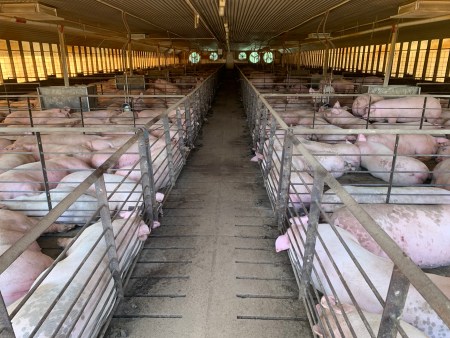
Will Butler enlisted help from Transfarmation, a nonprofit organization that works with farmers who, like Will and Tom Butler, are looking to get out of the contract meat-raising industry.
“[The] intergenerational transfer … or a family member taking over the farm, that's a big part of all the farmers we work with,” said Transfarmation director Tyler Whitley. “In a nutshell, what we do is help farmers who want to transition from raising animals at an industrial scale to raising plants.”
Whitley said that Transfarmation works to connect farmers with consultants in their local area who have expertise in whatever subject the farmer is interested in pursuing and also help them plan for the future.
“We'll work with a farmer to create a conversion plan for their farm that maybe repurposes the infrastructure.”
For the Butler’s project, Transfarmation connected them with an expert who developed plans for the 100 square foot room that was going to be used for the hog operation but is now going to be a mushroom production space. While Transfarmation works to cater to the vision of an individual farmer, it also strives to mainstream the work so that if another farmer comes along and is interested in growing mushrooms, for instance, the plans that were developed for the Butler production space may be shared.
During a phone conversation with Will Butler, he laid out his and his dad’s vision for the future.
“We want [to be an example] for hog farmers that kind of want to get out [of the business],” he said. “The pork that they're selling now — it’s not even their pigs, they’re contract growers, just providing the buildings and the labor.”
This article first appeared on North Carolina Health News and is republished here under a Creative Commons license.![]()
North Carolina Health News is an independent, non-partisan, not-for-profit, statewide news organization dedicated to covering all things health care in North Carolina. Visit NCHN at northcarolinahealthnews.org.


